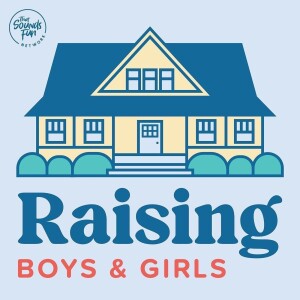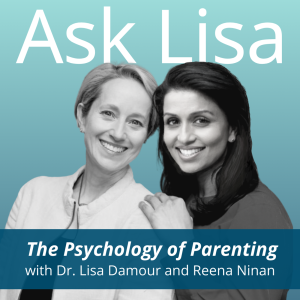

While Doing Laundry
https://feeds.captivate.fm/whiledoinglaundry/Episode List

Self Reflection for Birth Workers: An interview with Cheyenne Scarlett
I am so so excited to welcome Cheyenne Scarlet to the podcast She has a particular interest on how childbirth affects the mental health of parents, and in turn their relationships with their childrenLet’s talk about Baby Planner Baby Planner came about after doing my master's research and realizing that there's a lot of gaps, some of them being on the part of the healthcare providers, and some of them being on the part of the parentThere's a go with the flow attitude towards birth, which it's good to be flexibleBut often, when people say go with the flow, that means I'm not going to do any research, I'm not going to learn anything about birth, I'm just going to show up and see what happens. And I feel like that approach is particularly dangerous.We do know that making a plan and sort of having an idea of what you want, maybe not even a strict rigid plan, but sort of preferences or an outline of what you would like, you know, can help you reach that or help you have a more positive experienceI can support pregnant people and parents. But that is just me, you know, saying, here's the tools to protect yourself from the fire without actually putting out the fireAnd at the end of the day, it is not the responsibility of the person giving birth to stand there and like, protect themselves and like be fighting off interventions and things that they don't wantI am also working with the people that are perpetuating this thingMy book for healthcare workers is called My Deep Dive: a self reflective workbook for birth workersIt was honestly created out of a place of frustration, mostly surrounding the use of inclusive languageI was really frustrated that people are feeling offended by using the term birthing people birthing person, rather than motherI, as a black woman, belong to two groups of people who had to quite literally fight in court to prove that they were a person and should be valued in society and should have rights and should be able to vote The workbook itself is 10 chapters. And only two of them are actually about birth, like one is your beliefs about birth, and the second one is your practice as a birth workerBut all the other eight chapters are about how you live in the world, how you feel about the world, how you learn things about the worldIt's great for anyone that works with anyone who has experienced reproduction in any capacity - a lot of things are applicable for, like childcare workers or, or people who are working with young families in general, I'll give you an example from my study: a black mom had a really, really difficult birth. And the nurse asked her, Hey, do you want me to take your baby to the nursery, so you can take a nap? And her immediate thought was, Oh, my God, I can't say yes because she's going to think that I'm incapable that I'm a bad mom, you know, she's gonna want to call CPS because I am not capable of caring for my baby. And that might be if you don't know the history, in Canada, with, with cis, taking black and indigenous children more frequently than anybody else, you might think that's totally irrational, but it actually is totally rational for black woman to think that way. And if she had, you know, gotten defensive, the nurse would be like, Oh my god, this is just a difficult patient, right? And not recognizing that connection. So it's not even always about you and what you are doing, it's about the person that you're working with and how they are viewing your interaction.It’s not your fault if you hold stereotypes or bias towards a certain group of peopleBut it is now your responsibility to address those things and to change themGuest Bio:Cheyenne (she/her) is a researcher, educator and advocate. Cheyenne has an education background in child development and has a particular interest in how childbirth affects the mental health of parents and intern their relationships with their children. For her master's thesis, Cheyenne conducted a research project on the childbirth experiences of Black women in the GTA and has since been advocating for better perinatal health care on social media. Cheyenne is a trained childbirth educator and doula and she works with both parents and healthcare providers to improve birth for all people. Cheyenne is a mother to 2 biological children, 1 step-child and is currently expecting againBuy Cheyenne’s journal My Deep Dive: A self reflection workbook for birth workers here.Digital and hard copies available for order.If you sign up for the mailing list at babyplanner.ca then you'll get a $5 off coupon for My Deep Dive JournalFollow her on Instagram @motherofscarlettsMake sure that you go and check out all of those links to get to know Cheyenne better, to find a copy of the journal for yourself or just to follow along on the conversation over on Instagram. I will catch you next week!

Care Expectations Series: The Therapeutic Nurse-Client Relationship
This series is focused on the practice standards of nursing staff. Particularly, we will be focusing on the College of Nurses of Ontario practice standards. Download a copy to review here. And today's episode, we'll be diving into the core standard of therapeutic nurse client relationship, which is the document that covers the heavy hitting foundational expectations that your nursing staff are already held to. These standards are not unique to any particular area of nursingThe standards cover anyone who is a registered nurse - that includes registered practical nurses as well as registered nurses, advanced practice nurses, nurse practitioners, etc.As I mentioned, this series will cover the practice standards and other guiding documents that are behind nursing practice, particularly in Ontario With the very specific geographical context, keep in mind all of these documents and these governing bodies exist for your areaNursing standards are expectations that contribute to public protectionThey inform nurses of their accountabilities and the public of what to expect of nurses standards apply to all nurses regardless of their role, job description or area of practiceAt the core of nursing is the therapeutic nurse client relationship - the nurse establishes and maintains this key relationship by using nursing knowledge and skills, as well as applying caring attitudes and behaviorsThe nurse client relationship contains five core elements: trust, respect, professional intimacy, empathy, and powerTrust is critical, because as the client or the patient, regardless of the setting, but particularly when giving birth, you are extremely vulnerableThat is why trust tops the list, and it is important that your care providers establish this piece above all elseRespect is the recognition of the inherent dignity, worth and uniqueness of individualsRegardless of any reason that exists that another person may judge themSo this in particular calls on nurses to address their own internal biases around any number of ways that they could be discriminating against clients, without even knowing it, as well as actively participating in damaging disrespectful actionsProfessional intimacy is a concept that you may not have heard of beforeYou can understand and appreciate the physical closeness that nursing staff have when it comes to birthProfessional intimacy also includes the psychological aspects, spiritual and the social pieces that are part of the plan of care Having access to such intimate information, the secrets and the darkness that people carry, comes with great responsibilityEmpathy is the expression of understanding that goes a long way to validate a patient's experience Birth is a triumphant experience - if the people around you are not treating it as such, it's going to be very difficult for you to engage with it as a triumphant experienceNurses are the people who keep others safe - with that power comes the ability to harm them too We need to recognize from the get go that this relationship is always one of unequal power, and that power imbalance has so many implicationsWe don't even collect race specific data in Canada, let alone have discussions over how we treat black indigenous people of color in this countryWe can look at the data in the states and know that there are alarming discrepancies between the death rate of white and black birthing people This is not new information - we need to start talking about it because there are rules in place to prevent this from happening, and no one's doing anything about itThis is what the care expectation series is highlighting that there are ways for you to enforce and reinforce your needs being met, and then hold people accountable for not reading thatThere's no more second guessing whether or not the way you were treated was okay or notWe have ways to figure that out now and you have support to bring your concerns so that they will be heardI’m going to quickly summarize the rest of of the nurse-client relationship practice standard for youTherapeutic communication: nurses use a wide range of effective communication strategies and interpersonal skills to appropriately establish, maintain, re-establish and terminate the nurse-client relationshipClient-centred care: nurses work with the client to ensure that all professional behaviours and actions meet the therapeutic needs of the clientMaintaining boundaries: nurses are responsible for effectively establishing and maintaining the limits or boundaries in the therapeutic nurse-client relationshipProtecting the client from abuse: nurses protect the client from harm by ensuring that abuse is prevented, or stopped and reportedThis will be an episode all on its own - I'm going to specifically read out the indicators of this standard that often are violated within the labor and delivery or perinatal health spaceIf you're a care provider, if you're a nurse listening, if you're a doula, I want you to listen to this episode, it will be out next week on Wednesday, and really listen and reflect on your own practiceIt can feel really hard to reflect especially around patient abuse and whether or not you have been a perpetrator of such but if we don't take the time to really listen to what that is and truly look at our practice against that description we're going to continue to hurt people and/or we are going to continue to allow hurt and harm to occurThis is going to get deep and for those of you listening who are pregnant and wanting to create a birth experience where your care expectations are met and exceeded and respected, make sure that you reach out. The care expectations template is a tool that I've created for people who are wanting to identify what their own expectations are, but also create a clear way to communicate it to everyone around them. It’s a combination of saying, “This is what I know is possible. This is what I know you are expected to do. And this is how you're going to treat me.” Click here to download your free template.You do not want to miss an episode! Subscribe and make sure that you tune in next week at this time with a big old pile of laundry. Because we are getting down to it!

Am I allowed to do that in birth?
Let’s talk about care expectations! You can set your own care expectations regardless of where you are on your health journey: whether you are pregnant, post-partum, planning on pregnancy or addressing any other health concern. Knowing that you have the right to set care expectations is a real game changer, so let’s dive right in!Imagine you have spent the last several months planning a huge party You have planned out every detail right down to your favourite restaurant and your perfect hair and shoesYou arrive at your party, and your friends and family are there, and then this person you have never met takes over everythingThis person tells you “we’re not ready for you” and tells you to go “wait over there”Next, this person tells you there is nothing left for you to eat or drinkYour friends and family are there but nobody knows what to do so you just go along with whatever is happeningYou are defeatedObviously this scenario would never be ok in the hospitality industryWhy do we not hold our birth experience to the same standard?The profession of nursing is built on the therapeutic nurse-client relationshipThe therapeutic relationship must include trust and understanding, unbiased support, belief in the individual's autonomy and providing informed options for that client to make their own decisions. Somehow along the way, we mixed it up and in labor and delivery - the job and core value focuses on the baby instead of the birthing personWhy is the client not treated as the expert of knowledge and keeper of the answers when it comes to pregnancy and birth? As the client going in there to give birth, you have every right to set clear expectations about how you want to be treated and how your nursing staff and the rest of the care team is to treat you based on their own practice guidelinesYou are not being difficult, you are not asking for too much, you are simply highlighting that you are aware of what their professional responsibilities areIt’s not your fault that the system is broken Establishing care expectations with the background knowledge of what your nurses should be doing creates a powerful tool to be heard and to be treated the way you deserve to be treated during your birthing journey. Download your FREE Care Expectations PDF here.If you're interested in learning more about how to define your care expectations and have them met, don't miss next week's episode. I will be diving into the top three ways to ask for what you need. See you then!

PTSD from Childbirth
Welcome back to While Doing Laundry! Today we are going to talk about what birth trauma really is, and why many people have it but don’t even realize it. This may be a very emotional conversation for you, but listen to your body, trust your emotions, and see what comes to mind for you. I’m always here if you need me. -If you Google birth trauma, you will likely find references to physical birth trauma-Emotional and mental birth trauma is often overlooked-The Birth Trauma Association in the UK is closer to the mark-They define birth trauma as a post-traumatic disorder (PTSD) following birth-I use the term PTSD with caution, as many new parents feel like their symptoms are not “bad enough” to be classified as PTSD-If you broaden your definition of PTSD, it is simply a traumatic event or events where an individual feels their life is being threatened, or someone else around them is in danger, or if there is a threat to their dignity or person -My point is that even if you don’t have diagnosed PTSD after birth, you still may be suffering from birth trauma-I approach birth trauma as an overarching umbrella term that can capture anything as minute as disappointments, or mild frustration-In your experience, it could be as simple as a beautiful birth experience with one tiny, nagging memory that just doesn't sit well with you-That falls under this umbrella, just as much as the stereotypical very dramatic, traumatic life or death situation that some people bring with their stories that some people have shared-These stories carry as much value as do the stories of absolute heartbreak and stereotypical drama, and excitement, and overwhelm that come with many other birth stories-The common thread of birth trauma is the sensation, the experience of being silenced, and ignored even though you are the person who should be at the center of every decision, when you are pushed to the side, or whether you're just ignored and denied completely-When we enter the healthcare system, we want support, we want guidance, and we want to be led to good outcomes-Just the same as presenting to the ER with a broken ankle, we hope that would lead to a treatment plan that fits our needs -Diagnosis, treatment, and recovery are all key when repairing a broken ankle-Health care providers need to know about your life, your needs and how to help you get back to that-They need to be able to treat your ankle so you can get back to running up and down the stairs with a basket of laundry with a baby on your back-Childbirth should be the same, it should be based around the needs of the individual-Many healthcare providers don’t acknowledge the complex needs of birthing mothers-Birthing mothers exit the system traumatized and without any words to explain what they went through any without means of healing-This creates isolation for new parents and rifts in families-Many women feel forced to swallow their indignation and to “just keep smiling” as society dictates-You have a newborn baby, you don't want to miss out on making memories, dammit, put on some mascara, and force a smile for those newborn pictures-Condense that horrific story you just endured to the version that everyone else feels comfortable with- Because you get tired of hearing the people you trust and expect to keep you safe telling you just to be happy with your healthy baby. -They don't understand or don't have the skill set to support you with the trauma you experienced-Trauma does not go anywhere and it prevents you from transitioning into the next phase of life-If you don't work through what happens, you cannot bury a traumatic birth experience and expect to move through parenthood with joy and with absolute ownershipThe healthcare system doesn’t want to touch this topic because it would mean acknowledging the fact that these traumatic birth experiences happen at the hands of medical professionals. They happen within spaces that we assume to be safe. They happen within leading institutions across the world. Birth trauma doesn't just happen in isolated situations.If this is your story, I am so sorry. You deserved better. I am here for you if you need to talk, and I would love to help you work through your birth trauma. Contact me for more information. Click here to book a 1:1 call with me to learn more.

What is birth trauma?
Did your birth mess you up? If you feel like answering yes, then I would consider that to be some sort of birth trauma. Birth trauma is under-reported and when it is reported, it is often not taken seriously. Trauma changes us forever. In order to move on in your life, your trauma needs to be acknowledged and addressed. In today’s episode, we are looking at an overview of birth trauma and touching on some key points. When I worked in long-term care, I became familiar with a term called lived experienceThis is a term that describes an individual’s take on their own life storyTheir lived experience includes their profession, their habits, but most importantly their trauma, since trauma changes how we evolve as human beingsAs a care provider, you can ALWAYS benefit from knowing the lived experience of the individuals in your careSo why in long-term care, but not in perinatal care?The perinatal period (the time around pregnancy, birth and babyhood) has a profound experience on us as individualsLived experience needs to be applied to the birth experience, especially when trauma is involved25-34% of women report birth trauma, but there are many more women who do not report their traumaBirth trauma doesn’t have to be physicalAny threat to your emotional integrity in the birthing process is also birth traumaCommon examples: care providers teasing you, mocking you, rolling their eyes, or pressuring you into choosing birthing interventions such as inductions or requiring certain birthing positionsBirthing women often feel out of control and lost, and health care providers may take advantage of thatHealth care providers tend to focus on routine policies and proceduresYou are allowed to redefine the procedure by coming in with very clear expectationsYou will need to lead your healthcare providers instead of being led by themThere are many transitions in birth: the labour process itself, from one environment to another and from one healthcare provider to anotherThe transitions are the places where trauma is more likely to occurIn order to get through those transitions safely, you need to have a planHealthcare providers can and should help you through the transitions by understanding your lived experience and by giving you the space to do your thing while advocating for your planYour birth experience really happened. And it was a really big deal. I see you fighting back tears when you hear a good birth story or passionately protecting others on any social media thread you can. I get it. The guilt and a sense of failures still grips you. And very your birth is here to make you feel radically seen and invalidate your birth experience. And I've got. you the signature Unbury Your Birth process frees you from the heaviness that you may not even know exists, that is preventing you from enjoying parenthood fully. You can really unbury your birth and take back the power you deserve. You may not know where to begin, but I do. I've developed a clear simple, repeatable process to deconstruct your birth story and give you back the power hidden within it. Join me for a transformative six week program designed to give you the clarity, validation and freedom from the day you gave birth, to be able to move on to the rest of your life. Unbury Your Birth was created just for you. If you've ever felt:like you did something wrong angry about something that happened to you that dayas if you didn't do your best isolated because you tried to seek help, but felt like no one actually gets itYour birth story is worthy of being heard. Join a group of people just like you to process and redefine your birth experience. Unbury Your Birth is currently open for enrollment. We get started on June 17 at 12:30pm. So make sure that you book your enrolling call now. Space is limited. If you want to get in on this experience, it’s six weeks to process your birth for parents feeling let down by their birth experience. You absolutely want to head to this scheduling link to book an enrollment call now. Book a time to chat with me one on one and discover if it really is time to unbury your birth. Remember, you didn't fail. You were failed. And this is the way to move on. Are you ready to explore your lived experience surrounding birth? Hit me up today and we can book a consultation. Click this link to find a time that works best for you.
You may also like
Create Your Podcast In Minutes
- Full-featured podcast site
- Unlimited storage and bandwidth
- Comprehensive podcast stats
- Distribute to Apple Podcasts, Spotify, and more
- Make money with your podcast












